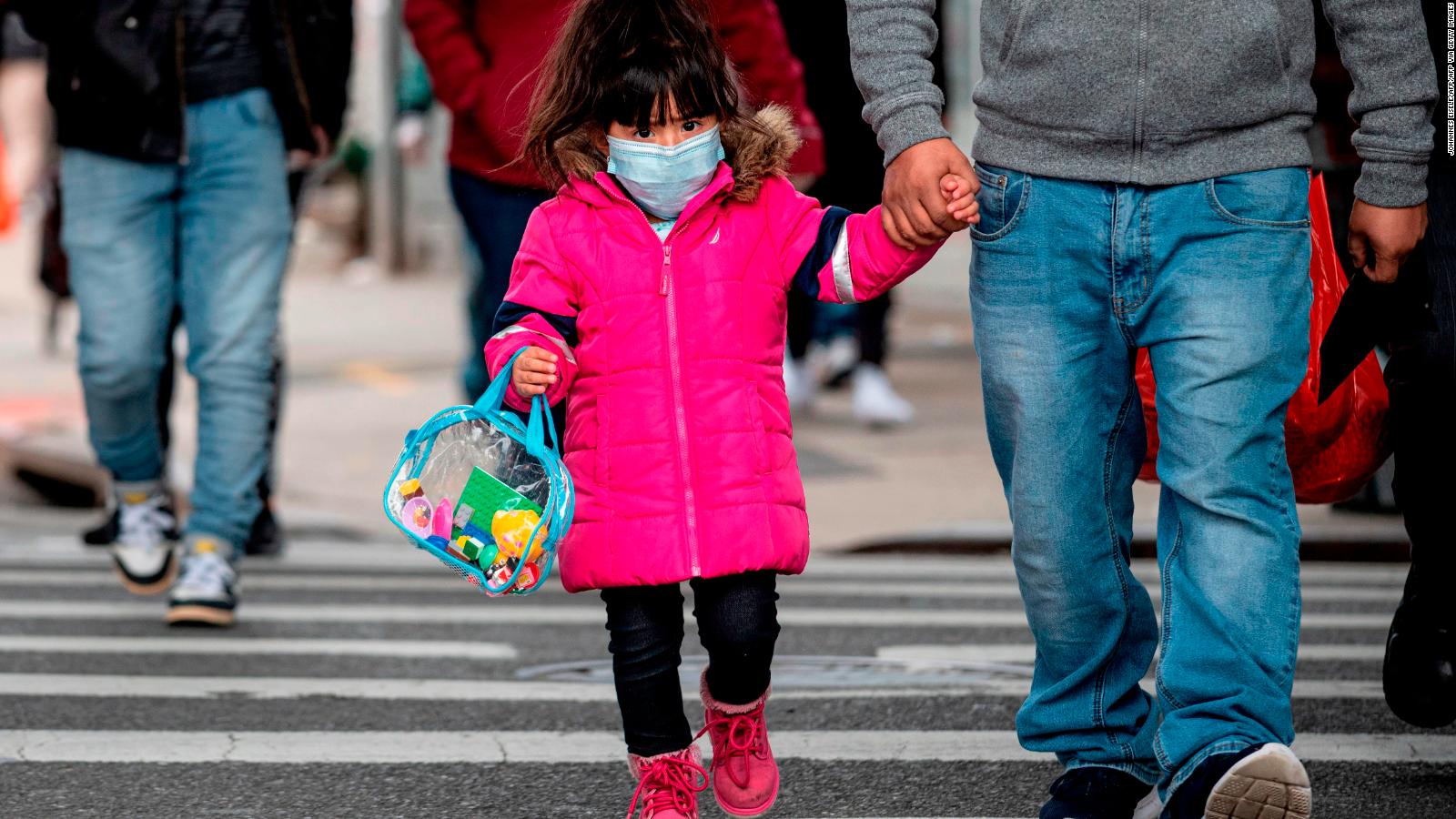They reinforce anticovid-19 measures in the United States 2:57
(CNN) -
The U.S. Centers for Disease Control and Prevention (CDC) released a new guide on Tuesday recommending reuse of masks indoors, including for those vaccinated people, in parts of the country with a high and considerable spread of the coronavirus.
The agency also urged that schools require masks from all students, teachers and visitors.
One reason for the change in orientation is growing evidence that vaccinated people can also infect others with the delta variant of the coronavirus.
Therefore, CDC officials advised people living at home with unvaccinated children or immunosuppressed family members to use extra caution and mask themselves indoors.
Leaked CDC document shows delta variant is much more contagious and could cause more serious illness
Many people wonder what this new CDC guide means for families.
Who should wear a mask and under what circumstances?
If parents have to go to work, should they wear masks when they are with their children?
Can grandparents continue to see their grandchildren safely?
Should the whole family be tested for covid-19 before being reunited, even those who are vaccinated?
To help us understand all of this amid the changes to the CDC guidance, we turned to CNN Medical Analyst Dr. Leana Wen.
Wen is an emergency room physician and visiting professor of health policy and management at the Milken Institute School of Public Health at George Washington University.
She is also the author of a new book, "Lifelines: A Physician's Journey in the Fight for Public Health."
Many people wonder what this new CDC guide on masks means for families.
CNN: What does the new CDC guidance mean as to who should wear masks and when?
advertising
Dr. Leana Wen:
From what I understand the new guidance from the CDC is that there is a group that needs to take special care in a way that is different from the previous guidance.
Previously, the CDC said that vaccinated people are well protected against severe disease and are not likely to transmit the virus to other people.
Therefore, previous guidance indicated that it was not necessary for them to wear masks.
In contrast, the unvaccinated are not protected.
Especially with the more contagious delta variant in circulation, unvaccinated people are at high risk of contracting COVID-19 and transmitting the virus.
They should wear masks when indoors.
This is still true with the new guide.
The CDC now says that vaccinated people should also wear masks indoors, especially if they live at home with unvaccinated or immunosuppressed people.
What I understand from this guidance is that these people - and I am one of them, with two children under 12 who cannot yet receive the vaccine - are at high risk due to the possibility of transmitting covid-19 to people with which we live.
We are still well protected ourselves from the severe outcomes of the coronavirus, but we want to reduce the risk by wearing masks indoors to protect the vulnerable people in our family.
CNN: Many grandparents now wonder if they have to be more careful to avoid infecting their grandchildren. Can grandparents safely continue to see their unvaccinated grandchildren?
Wen:
Yes, although I think it is a good idea for people who are going to be around vulnerable unvaccinated people to be cautious and try to reduce their risk, especially if they are in an area of high coronavirus transmission.
This means wearing face masks, limiting time indoors and in crowded places, and recognizing that the risk is cumulative, meaning that if you choose to participate in a high-risk activity, such as going to a large wedding with unvaccinated guests, you should Try to reduce other high-risk exposures to lower your overall risk.
Biden: The pandemic is unvaccinated 2:59
I want to clarify that vaccines are still very effective, but they are not 100%.
One analogy I like is that vaccines are a great waterproof coat.
They will protect you in a drizzle and even a moderate storm.
But if you encounter daily storms, at some point you will get wet.
There are parts of the country that are in a drizzle.
The level of vaccination in the community is high and the infection rate is low.
The chance that you will meet an asymptomatic infected person is low, and if you are vaccinated, the risk that you will contract COVID-19 and then infect your grandchildren is very low.
If you live in such an area, you can probably go about your normal daily activities without worrying too much that you could pass the coronavirus on to your family.
That is different if you are in a community that is experiencing a large increase in cases.
Where vaccination rates are low and infections are high, you are more likely to come into contact with infected people.
In these circumstances, a waterproof coat may not be enough - you may also need an umbrella.
Think of the mask as that umbrella, that extra layer of protection.
You may also want to reduce your exposure to other high-risk activities.
I probably wouldn't go to closed bars or crowded gyms where other people around me don't have a mask.
Reducing your risk of exposure will also reduce the likelihood of being an asymptomatic carrier that could carry COVID-19 to your unvaccinated grandchildren.
CNN: What about parents who work jobs where they are exposed to unvaccinated and unmasked people? Should they bring a mask at home?
Wen:
It is a difficult situation.
I hope that workplaces have procedures in place to keep employees safe.
Ideally, they would require proof of vaccination, or at least periodic testing for covid-19.
If not, they should apply the use of masks and physical distancing.
The Disney parks where you will have to wear a mask 0:41
If you find yourself in a situation where your workplace does not have these protocols, you can still try to stay safe. This includes wearing an N95 or KN95 mask when indoors and in confined spaces with other people whose vaccination status is unknown. Try to avoid maskless meetings whenever possible; for example, have lunch at your desk instead of with other people. If possible, raise your concerns with your supervisor and see if you can be reassigned a workspace away from others or if you can at least try to avoid crowded conference rooms.
I think it is very difficult for parents to continually wear masks in their own homes near their children, except in very specific and time-limited situations, such as if they have symptoms or are waiting for a coronavirus test.
It is best to try to reduce the risk at work as much as possible.
CNN: If a large family gets together, what is the safest? Let's say some are vaccinated and some are not.
Wen:
The safest thing is to meet outdoors.
In that case, you don't need to wear masks or get tested.
If indoor meetings are planned with a mixed vaccination status group, ideally everyone is quarantined first and then tested.
With the rise of the delta variant, this is the safest option to help keep families safe.
CDC guidelines change a lot.
We have to do everything we can to reduce our risk while at the same time getting back to the parts of our life that are most important.
Vaccination is still the best way to protect ourselves and our loved ones.
CDCCovid-19 masks






